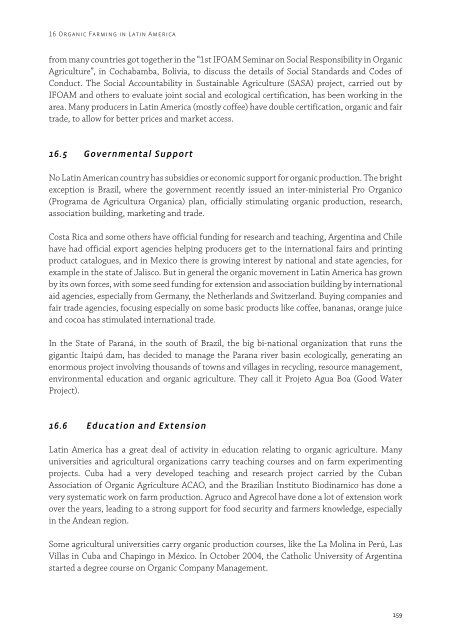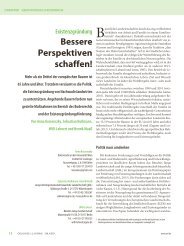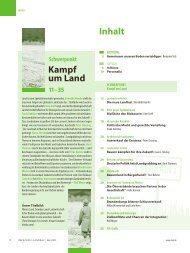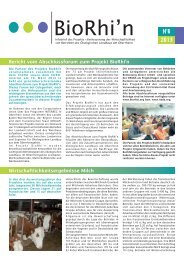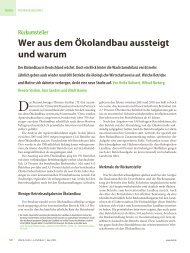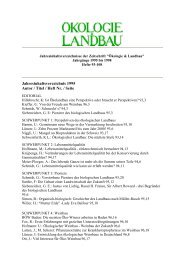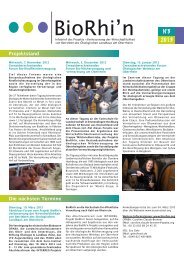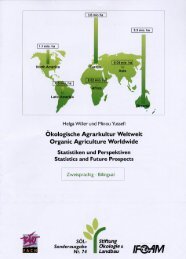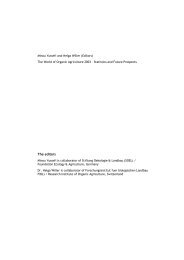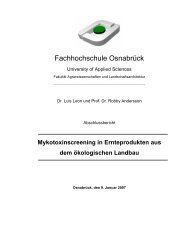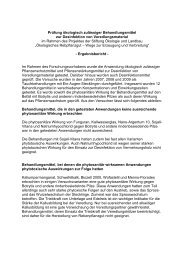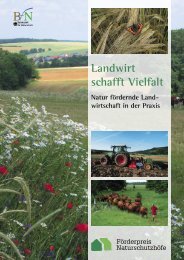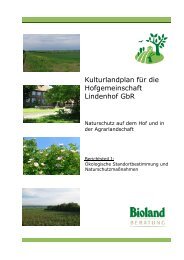the world of organic agriculture - Organic Eprints
the world of organic agriculture - Organic Eprints
the world of organic agriculture - Organic Eprints
Create successful ePaper yourself
Turn your PDF publications into a flip-book with our unique Google optimized e-Paper software.
16 <strong>Organic</strong> Farming in Latin America<br />
from many countries got toge<strong>the</strong>r in <strong>the</strong> “1st IFOAM Seminar on Social Responsibility in <strong>Organic</strong><br />
Agriculture”, in Cochabamba, Bolivia, to discuss <strong>the</strong> details <strong>of</strong> Social Standards and Codes <strong>of</strong><br />
Conduct. The Social Accountability in Sustainable Agriculture (SASA) project, carried out by<br />
IFOAM and o<strong>the</strong>rs to evaluate joint social and ecological certification, has been working in <strong>the</strong><br />
area. Many producers in Latin America (mostly c<strong>of</strong>fee) have double certification, <strong>organic</strong> and fair<br />
trade, to allow for better prices and market access.<br />
16.5 Governmental Support<br />
No Latin American country has subsidies or economic support for <strong>organic</strong> production. The bright<br />
exception is Brazil, where <strong>the</strong> government recently issued an inter-ministerial Pro <strong>Organic</strong>o<br />
(Programa de Agricultura <strong>Organic</strong>a) plan, <strong>of</strong>ficially stimulating <strong>organic</strong> production, research,<br />
association building, marketing and trade.<br />
Costa Rica and some o<strong>the</strong>rs have <strong>of</strong>ficial funding for research and teaching, Argentina and Chile<br />
have had <strong>of</strong>ficial export agencies helping producers get to <strong>the</strong> international fairs and printing<br />
product catalogues, and in Mexico <strong>the</strong>re is growing interest by national and state agencies, for<br />
example in <strong>the</strong> state <strong>of</strong> Jalisco. But in general <strong>the</strong> <strong>organic</strong> movement in Latin America has grown<br />
by its own forces, with some seed funding for extension and association building by international<br />
aid agencies, especially from Germany, <strong>the</strong> Ne<strong>the</strong>rlands and Switzerland. Buying companies and<br />
fair trade agencies, focusing especially on some basic products like c<strong>of</strong>fee, bananas, orange juice<br />
and cocoa has stimulated international trade.<br />
In <strong>the</strong> State <strong>of</strong> Paraná, in <strong>the</strong> south <strong>of</strong> Brazil, <strong>the</strong> big bi-national organization that runs <strong>the</strong><br />
gigantic Itaipú dam, has decided to manage <strong>the</strong> Parana river basin ecologically, generating an<br />
enormous project involving thousands <strong>of</strong> towns and villages in recycling, resource management,<br />
environmental education and <strong>organic</strong> <strong>agriculture</strong>. They call it Projeto Agua Boa (Good Water<br />
Project).<br />
16.6 Education and Extension<br />
Latin America has a great deal <strong>of</strong> activity in education relating to <strong>organic</strong> <strong>agriculture</strong>. Many<br />
universities and agricultural organizations carry teaching courses and on farm experimenting<br />
projects. Cuba had a very developed teaching and research project carried by <strong>the</strong> Cuban<br />
Association <strong>of</strong> <strong>Organic</strong> Agriculture ACAO, and <strong>the</strong> Brazilian Instituto Biodinamico has done a<br />
very systematic work on farm production. Agruco and Agrecol have done a lot <strong>of</strong> extension work<br />
over <strong>the</strong> years, leading to a strong support for food security and farmers knowledge, especially<br />
in <strong>the</strong> Andean region.<br />
Some agricultural universities carry <strong>organic</strong> production courses, like <strong>the</strong> La Molina in Perú, Las<br />
Villas in Cuba and Chapingo in México. In October 2004, <strong>the</strong> Catholic University <strong>of</strong> Argentina<br />
started a degree course on <strong>Organic</strong> Company Management.<br />
159


